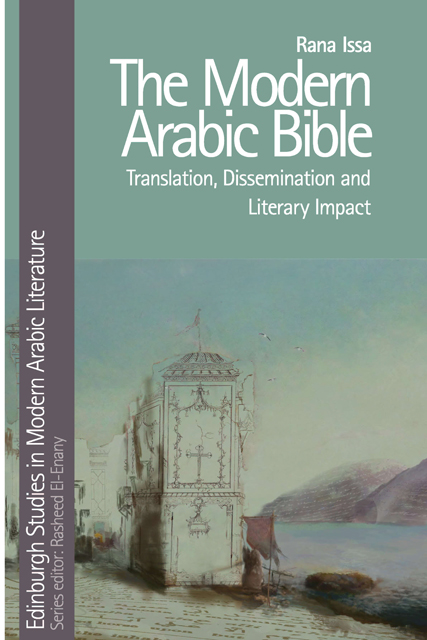Book contents
- Frontmatter
- Contents
- List of Figures
- Series Editor’s Foreword
- Acknowledgements
- Note on Transliteration and Abbreviations
- Dedication
- Introduction
- 1 The Missionary Bible
- 2 Bible Competition
- 3 Standardising Arabic
- 4 Butrus al-Bustani as Translator
- 5 Ahmad Faris Al-Shidyaq’s Bible as Literature
- Conclusion: In the Beginning was Translation
- Bibliography
- Index
5 - Ahmad Faris Al-Shidyaq’s Bible as Literature
Published online by Cambridge University Press: 02 June 2023
- Frontmatter
- Contents
- List of Figures
- Series Editor’s Foreword
- Acknowledgements
- Note on Transliteration and Abbreviations
- Dedication
- Introduction
- 1 The Missionary Bible
- 2 Bible Competition
- 3 Standardising Arabic
- 4 Butrus al-Bustani as Translator
- 5 Ahmad Faris Al-Shidyaq’s Bible as Literature
- Conclusion: In the Beginning was Translation
- Bibliography
- Index
Summary
Recounting the scene of the Last Supper, St John writes in 13:4, that upon finishing the meal, Jesus ‘riseth from supper, and laid aside his garments; and took a towel and girded himself’. When Ahmad Faris al-Shidyaq sat down to translate those words into Arabic, he chuckled to himself, took note, and later commented on the verse in a polemical manuscript entitled Mumahakat al-taʼwil fi Munaqadat al-Injil (Squabbles and Disputations over Gospel Interpretations, 1851). He was still in the employment of the British SPCK, working with the Chair of Oriental Studies at Cambridge Rev. Samuel Lee (1783–1852) on translating the Bible, when he began to circulate this manuscript amongst a trusted group of friends. In it, al-Shidyaq ridicules the narrative produced in the Bible. He writes
John recounts that after the supper, Issa [Jesus] took off his clothes and tied a towel around his waist to wash the feet of his disciples. This implies that, at the time, Issa was drunk; that he did not know what he was doing, for the washing of feet does not require getting naked.
This was the first book al-Shidyaq circulated that was not on commission from the missionaries. Keeping it in manuscript and never printing it, al-Shidyaq controlled its circulation. Nevertheless, with this small book, al-Shidyaq sets the framework through which he would define his literary vocation.
Literature as he contended was irreverent; not even the Bible was too divine for its whimsical exploits. His is what Emily Apter would have characterised as a ‘dispossessive stance’ that cast the Bible ‘as an unownable estate, a literature over which no one exerts propriety prerogative and which lends itself to a critical turn that puts the problem of property possession front and center’. Dispossessing the Bible through carnal acts of reading, al-Shidyaq recuperates the literary as a critical possibility that questions the precepts of capitalist relations of production in the scholarly and authorial professions. Through working towards a new conception of adab, al-Shidyaq wrestled with the modalities of alienated labour as a Bible translator. Through metaphors of literary consumption, he reconciled his labour with the whims and desires of the authorial self and evolved a notion of adab that emanates in concrete and intimate ways from the body and its activities.
- Type
- Chapter
- Information
- The Modern Arabic BibleTranslation, Dissemination and Literary Impact, pp. 188 - 213Publisher: Edinburgh University PressPrint publication year: 2023

